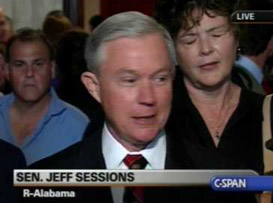Senate Testimony Signifying Nothing
Andrew Hyman, a conservative attorney who has been promoting John Roberts vigorously since his selection by President Bush, abandoned the judge in response to his answers during the first day of the confirmation hearings:
It now appears very possible to me that President Bush has nominated a pro-Roe vote in place of an anti-Roe vote. It appears from this morning's testimony -- and I could be wrong about this -- that Judge Roberts will probably affirm the so-called right to obtain an abortion all the way up until viability, even though 72% of women in the United States have consistently said that abortion should generally be illegal months before viability.
Read the entire discussion, one of the most fascinating I've found on the Roberts hearings, and you'll find that conservatives have no more idea than liberals what we're getting for the next 30 years. With a voice as soothing as an NPR host, Roberts has shown that he's expert on constitutional law, quick-witted, and intelligent enough to give the American public absolutely no clue as to his judicial philosophy.
He's also extremely personable. After hearing his encyclopedically vague answers for three days, I like Roberts so much I resent myself for wanting to know anything about him.
Throughout the hearings, Roberts has relied often on the rationale that he can't provide his opinion on matters that might be revisited by the court. He even used it to avoid discussing Bush v. Gore, a case in which the Supreme Court explicitly stated it was not setting a precedent. Here's the exchange about the case with Wisconsin Sen. Herb Kohl:
KOHL: I asked you what your opinion of that decision was at that time.
ROBERTS: Well, that's an area where I've not been -- I've not felt free to comment whether or not I agree with particular decisions or...
KOHL: Well, it's not likely to come up again.
ROBERTS: Well, I do think that the issue about the propriety of Supreme Court review in matters of disputed electoral contests, it is a matter that could come up again. Obviously, the particular perimeters in that case won't, but it is a very recent precedent.
And that type of a decision is one where I thought it inappropriate to comment on whether I think they were correct or not.
If the nation no longer expects candor from Supreme Court justices, the Judiciary Committee should adopt the format of What's My Line?, with blindfolded senators asking a series of yes-no questions of the nominee to determine his identity. The winner could receive a federal highway named in his honor and three ethical violations to be named later.
Justice Junction, What's Your Function?
The primary job of Republicans on the Senate Judiciary Committee is to run out the clock and help John Roberts say as little of substance as possible during the confirmation hearings. Some of them are better at this than others.
Alabama Republican Jeff Sessions used his alloted time yesterday to make Roberts walk through the process of how a case reaches the Supreme Court and becomes a decision:
SESSIONS: So the lawyers from both sides then appear before the court, over in the Supreme Court building, and they answer questions and make their presentations as to why they think the court should rule the way they would like it to?
ROBERTS: They usually get an hour for the whole case.
So each side gets a half hour and that half hour is taken up almost entirely by the justices' questions.
I hope that Sessions, the former attorney general of Alabama, will test Roberts next on the three branches of government and how a bill becomes a law.
Everyone Likes John Roberts
Republicans and Democrats alike noted Mr. Bush's shrewdness in promoting Mr. Roberts so fast. As the president put it: "For the past two months, members of the United States Senate and the American people have learned about the career and character of Judge Roberts. They like what they see." Journalists have delved deep into his closets without finding anything resembling a skeleton. Liberals find him personally likeable.
This passage from The Economist embodies the conventional wisdom on John Roberts: He's good enough, he's smart enough, and doggone it, people like him.
Though America is infatuated with the affable 50-year-old Court of Appeals judge, we're deciding whether to make a lifelong commitment here. Shouldn't we be in love with him first?
As Chief Justice, Roberts could be handed the keys to the Constitution for the next 30 years -- even longer if scientists figure out how to keep floating heads alive in jars. He may be the swing vote in deciding whether we can refuse end-of-life medical treatment, buy contraception, and bugger each other like minks in the privacy of our homes.
During a conference call I joined with other liberal bloggers last night, Sen. Ted Kennedy made the case for roughing up Roberts during the nomination hearings.
"Our Republican colleagues seem to be working from the same playbook ... he doesn't have to answer any questions," Kennedy said. "We can only wonder why they don't want us to know about him."
Tough questions will be regarded as unfair by conservatives, aside from the small number who join Ann Coulter in believing that Roberts is a stealth nominee as likely to be a Souter as a Scalia.
Though it might make Sen. Coburn cry, Democrats must stand in strong opposition to Roberts until he demonstrates that he deserves the job. There's only one correct answer to the question, "do Americans have a right to privacy?," and it isn't "I won't tell you because I want it to be a surprise."
In 1928, Justice Louis Brandeis was alone on the Supreme Court in believing that the government could not wiretap its citizens without a warrant, writing in dissent:
The makers of our Constitution understood the need to secure conditions favorable to the pursuit of happiness, and the protections guaranteed by this are much broader in scope, and include the right to life and an inviolate personality -- the right to be left alone -- the most comprehensive of rights and the right most valued by civilized men.
We live in the future predicted by Brandeis, who recognized that "the progress of science in furnishing the government with means of espionage is not likely to stop with wire tapping." Roberts must demonstrate, without equivocation, that he will affirm the right of Americans to be left the hell alone.
Anyone who would give him the benefit of the doubt -- in deference to President Bush -- should ask themselves whether an administration that believed Mike Brown could lead the country through disaster has any idea what it's getting in John Roberts.
Oklahoma Senator Cries Justice
Freshman Sen. Tom Coburn of Oklahoma cried during his opening remarks at the Supreme Court confirmation hearings for John Roberts, which you can see on C-Span (RealPlayer link), right around the time he delivered this passage:The opportunity to sit on this committee at this time in our nation’s history will be among my most important tasks as an elected official. When I ponder our country and its greatness, its weaknesses, and its potential, my heart aches for less divisiveness, less polarization, less finger pointing, less bitterness and less mindless partisanship, which, at times, sounds almost hateful to the ears of ordinary Americans.
Coburn's an odd bird in the Senate, a practicing family physician and rigid social and fiscal conservative who once used his Judiciary Committee seat to tout breast implants:
If you have them, you're healthier than if you don't. That is what the ultimate science shows. ... In fact, there's no science that shows that silicone breast implants are detrimental and, in fact, they make you healthier.
I don't know what he has to cry about, with two seats on the Supreme Court in the easy reach of the Republican majority in D.C. Unless Roberts forgot to tell anyone he murdered a series of drifters along the Potomac in the '80s, the guy seems like a lock for the chief justiceship.
My fellow Democrats are the ones who should be crying.
C-Span has begun podcasting on a trial basis, offering three weekly programs: The current events interview shows American Perspective and Q&A and the Book TV interview show After Words.The copyright notice for the podcasts makes note of something that's often misunderstood about C-Span -- the programs are not in the public domain:
Except as specifically permitted by this policy, C-SPAN's RSS feeds and audio files may not be used for any political, commercial or otherwise unauthorized purpose. Any posting, retransmission, sale, public performance or other unauthorized duplication of the audio files is strictly prohibited.
C-Span is produced by a non-profit corporation set up by the cable industry that receives no government funding. All of its content is protected by copyright and the network explicitly forbids redistribution on the Internet.
Reports of Euthanasia in New Orleans
The international press is reporting today that some doctors in New Orleans overdosed critically ill patients with morphine during the aftermath of Hurricane Katrina, believing they couldn't make it out alive during a hospital evacuation.A doctor, whose identity was protected by the paper, explained the decision:
We divided patients into three categories: those who were traumatised but medically fit enough to survive, those who needed urgent care, and the dying. People would find it impossible to understand the situation. I had to make life-or-death decisions in a split second. It came down to giving people the basic human right to die with dignity.
The only source named in the article, William "Forest" McQueen, was mentioned earlier in other British accounts as the husband of a British woman. From the way he's described in various articles, he appears to have been working for power companies clearing downed electric lines north of Lake Pontchartrain.
Ophelia has moved away from Florida and taken all of our storm clouds, leaving behind a picture-perfect Saturday in Jacksonville. I played softball this morning, pulling muscles in my back I didn't even know I had.The storm's latest projected track appears to foretell a Tuesday landfall in North Carolina as a category 2 hurricane, according to Jeff Masters:
As usual, all this is subject to a high degree of uncertainty. South Carolina is still at high risk, and Georgia still at some risk. Remember that a hurricane is not a point, and the effects of this hurricane will be felt over a wide area.
Today marks the halfway point of the hurricane season, which is expected to bring another three major hurricanes of category 3 strength or higher.
I'm thinking about starting a new ecommerce site selling "The End is Nigh" signs.


